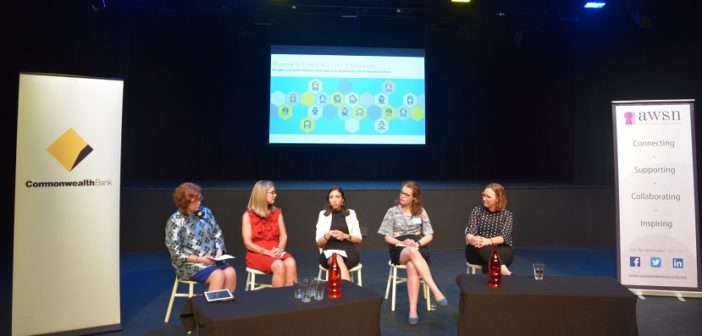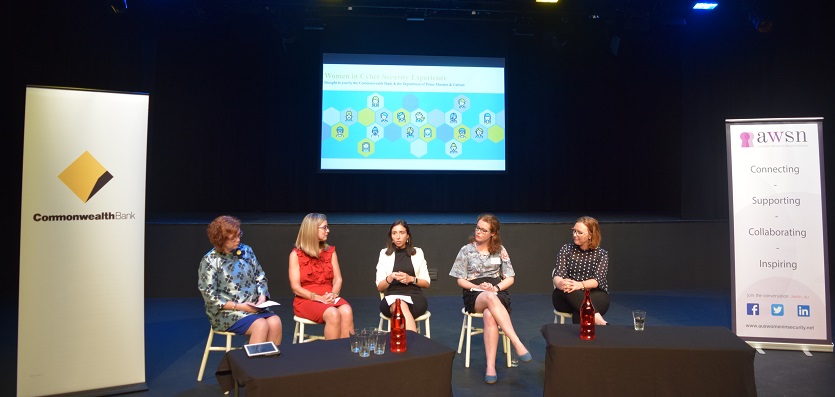
Advocating to have women join the cybersecurity ‘ecosystem’ requires a broad industry shift in thinking, on behalf of women, as well as for men. This shift needs to be supported and encouraged by a longer term societal cultural change. Indeed, broad cultural change is also needed for heightened societal cybersecurity awareness. Raising the mix of diversity in cybersecurity, in particular with the encouragement of women to have a greater presence, is not only likely to contribute to meeting the skills requirements of the cybersecurity sector but also facilitate the wide community change needed in cybersecurity awareness. There’s a double payback opportunity.
Cultural shifts take time and require active nurturing and facilitation. That’s why events like the Women in Cyber Mentoring Experience (#WICME2017), held yesterday in Sydney and concluding today, provides an important opportunity for a select number of women to take a peek through some ‘open doors’. It will remain up to them to decide which doors to walk through.
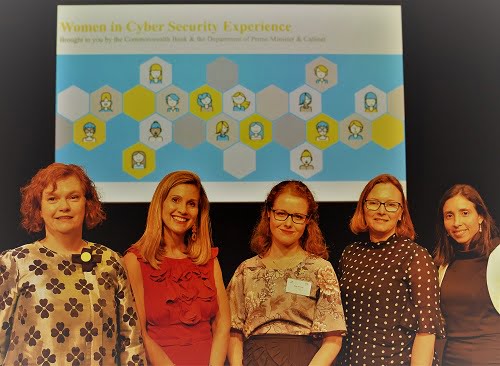
L-R Sandra Ragg, Julie Inman-Grant, Amy Corkery, Sandie Bradley, Daniela Fernandez
Following from last week’s event at PwC in Melbourne, this week in Sydney, the WICME2017 commenced with an opening presentation from Kate Ingwersen, General Manager, Office of the CISTO at the Commonwealth Bank and highlighting the path to parity being made within the bank’s own cyber security workforce. The ladies then heard from Sandra Ragg, First Assistant Secretary, Office of the Cyber Security Special Advisor, Department of the Prime Minister & Cabinet and Narelle Devine, Chief Information Security Officer with the Department of Human Services. These insights from industry leaders set the scene for the two day programme, with day one immersion sessions across the Commonwealth Bank’s cyber security teams.
Tuesday’s afternoon panel session, facilitated by Sandra Ragg and attended by over 100 women and men from the membership base of the Australian Women in Security Network (‘AWSN’), heard from Julie Inman-Grant, E-Safety Commissioner, Amy Corkery, Advisor at Department of the Prime Minister and Cabinet, New Zealand, Sandie Bradley, Executive Director Cyber Security at Australian Cyber Security Centre and Daniela Fernandez, Senior Manager Cyber Security Reporting and Analytics at Commonwealth Bank.
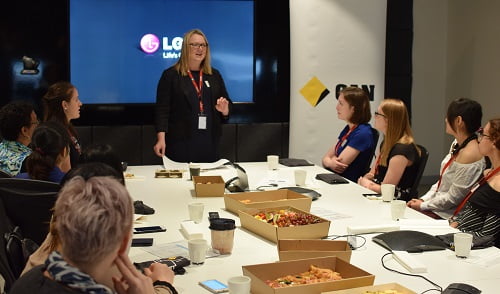
Narelle Devine – CISO – DHS #WICME2017
Held under Chatham House rule, the panel gave insight into their own personal backgrounds, motivations, challenges and perspectives. Importantly, the panel took the opportunity to delve deep into some of the issues involved and alongside their diverse backgrounds, providing an international flavour with representation from the United States, Colombia, New Zealand and role diversity across government and industry – as well as science, technology and community. The ‘do social good mission’ was apparent on several levels. Despite reaching senior roles, there was an acknowledgement women are still inclined to undersell themselves and often lack the confidence to reach further and beyond what their skills and expertise may suggest possible.
The purpose and importance of these events and others like it is for women to tell their story, create opportunity and educate the workplace on how diversity needs to be embraced and accommodated. With just 11% of the workforce being women, men therefore make up near 90% – so this dominance can be challenging for many women – hence why there can be a reluctance and barrier. The unconscious bias term featured prominently amongst others, including the stereotypical ‘male in a hoody’, and the need for women to create networking and mentoring channels, assist one another where they can and influence change in the work environments to be family friendly, flexible, mobile and adaptable. This will all still be new for many Australian work environments and possibly of a greater challenge for the small and medium business workplaces. Yet despite the discussion being important, sustained action and opportunity will remain essential.
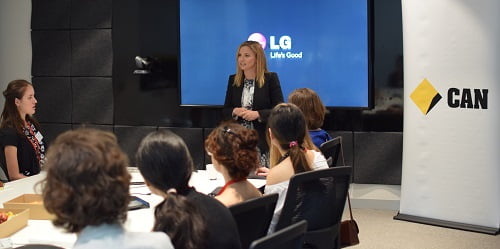
Kate Ingwersen – Commonwealth Bank
Today’s Day 2 of the WICME programme will be at the University of NSW, with a Speed‐Mentoring session and technical workshops at UNSW Sec.Edu Security computing lab.
MySecurity Media recorded interviews for the Cyber Security Weekly Podcast with Sandra Ragg, Narelle Devine, Julie Inman-Grant and Heide Young. These will be released shortly.
To listen to last week’s interview by Morry Morgan at the #WICME2017 Melbourne programme, with Sandra Ragg, Erica Hardinge, Head of Security Enablement at ANZ Bank, Michelle Price, Chief Operating Officer at AustCyber, and Megan Haas, Partner, Cyber Security and Forensic Services at PwC – check it out here!
Further reading:
The Department of Prime Minister and Cabinet (PM&C) conducted exploratory research into women’s low representation in the cyber security industry, and found that marketing, role models, and hiring practices are barriers to attracting women into the industry. Further, these initial findings also include that workplace culture, a lack of flexible working arrangements, and persistent discrimination impede women’s retention in the industry (Department of Prime Minister and Cabinet, 2017).
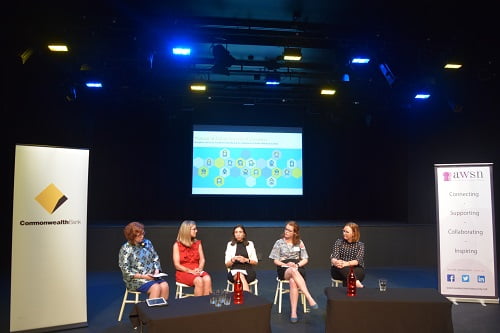
L-R Sandra Ragg, Julie Inman-Grant, Daniela Fernandez, Amy Corkery, Sandie Bradley
This report examines the existing limited research on women in the cyber security industry, and women in science, technology, mathematics, and engineering (STEM) and information and communication technology (ICT) to identify barriers to women’s labour market participation. Overall, PM&C’s initial findings hold. While limited research exists on women’s participation in cyber security, findings from the burgeoning and ever-increasing STEM and ICT literature provide useful indicators of barriers to women in cyber security, revealing a complex and multi-layered picture, replete with persistent and enduring barriers. Barriers to girls and women commence early – from primary school – and continue throughout women’s careers to the executive levels. Barriers also exist at all stages of the employment life cycle, from recruitment to career development and performance management, culminating in women leaving the industry.
Full Report: https://www.pmc.gov.au/resource-centre/cyber-security/women-cyber-security-literature-review

